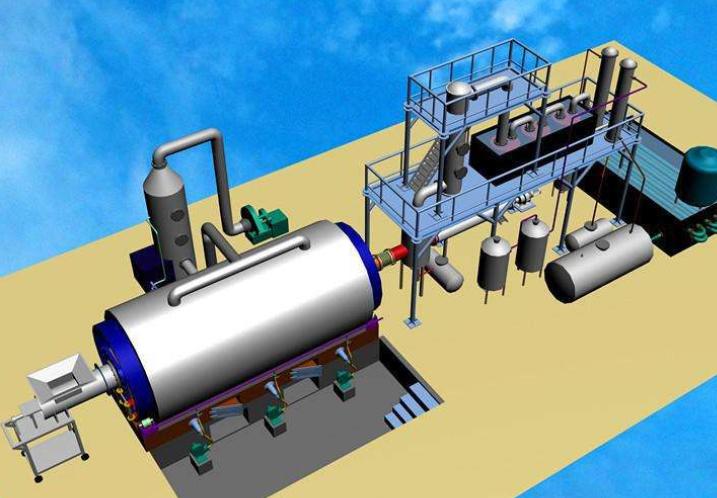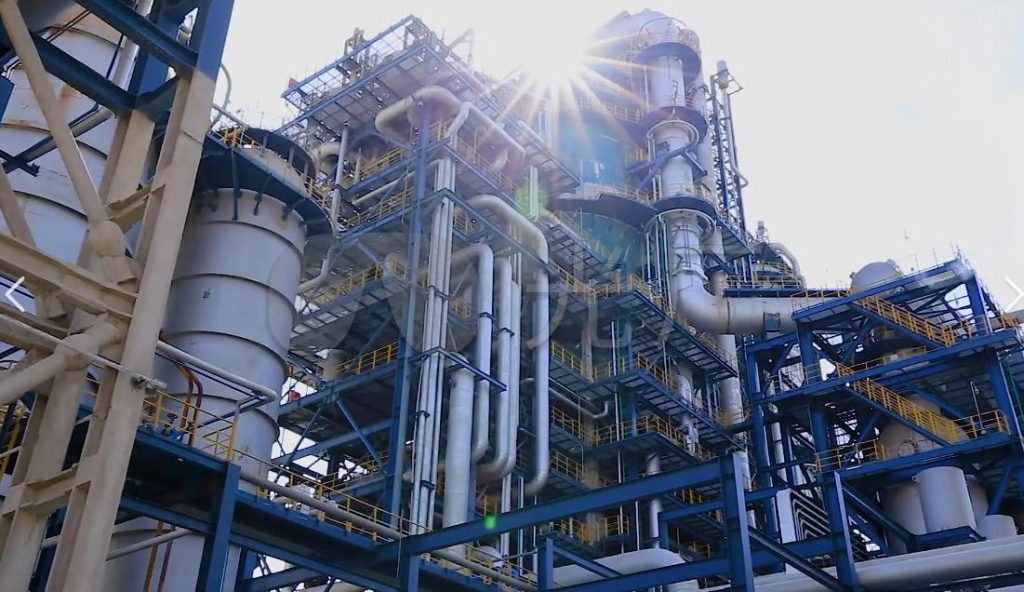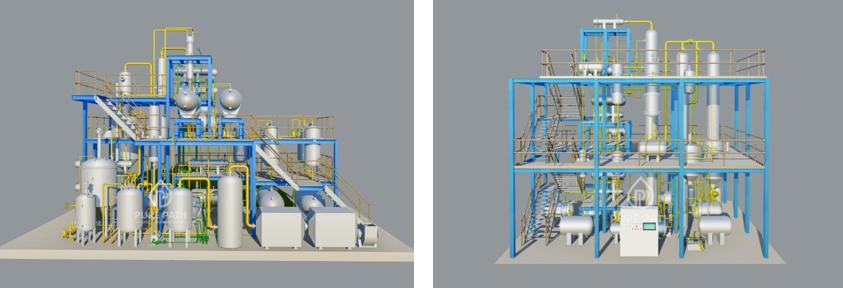Waste Oil Distillation Technology in the Chemical Industry
Waste oil distillation technology is an important technology in the chemical industry, mainly used for the recovery and reuse of waste oil. By distilling waste oil, the useful components in the waste oil can be separated from the harmful components, and then recycled, reducing environmental pollution and saving resources. This article will explore the application of waste oil distillation technology in the chemical industry.
Development of Waste Oil Distillation Technology
Waste oil distillation technology, as a process for converting waste oil into usable resources, has made significant progress in recent years. This technology not only helps reduce environmental pollution but also provides a new economic growth point for the chemical industry.

Technology Development History
- Early Stage: Early waste oil distillation technology was relatively simple and was mainly used to recover some usable oil products. However, due to technical limitations, the recovery rate was low, the product quality was unstable, and it caused certain pollution to the environment.
- Improvement of Traditional Distillation Technology: With the development of industry, people have put forward higher requirements for waste oil treatment. Traditional distillation technology has been continuously improved, and the distillation efficiency and product purity have been improved by optimizing heating methods and improving vacuum degrees.
- Introduction of New Separation Technology: In recent years, some new separation technologies, such as molecular distillation and membrane separation, have been introduced into the field of waste oil distillation. These technologies have the characteristics of high efficiency and strong selectivity and can handle more complex waste oils and obtain high-value-added products.
- Intelligent Control and Optimization: With the advancement of automation and information technology, the control of the waste oil distillation process is becoming more and more intelligent. By establishing a mathematical model and optimizing process parameters, precise control of the entire process can be achieved, and product quality and energy efficiency can be improved.
Technology Development Trend
In the future, waste oil distillation technology will pay more attention to greening, adopting cleaner energy, and reducing the emission of wastewater and waste gas.
Through technologies such as the Internet of Things and big data, the entire distillation process can be monitored and optimized in real-time to improve production efficiency and product quality.
Integrate waste oil distillation with other processes, such as catalytic cracking and hydroprocessing, to achieve deep conversion and high-value utilization of waste oil.
Develop customized distillation processes based on the composition and properties of different waste oils to improve product targeting.
Application of Waste Oil Distillation Technology in the Chemical Industry

As an efficient means of resource recovery, waste oil distillation technology has broad application prospects in the chemical industry.
1. Regeneration of lubricating oil base oil
After long-term use, lubricating oils such as waste engine oil will be mixed with metal wear debris, oxides, and other impurities, resulting in a decrease in lubrication performance. Through distillation, these impurities can be effectively removed, and the performance of the base oil restored. The regenerated base oil can be reused to produce lubricants of various specifications, such as engine oil, gear oil, hydraulic oil, etc., to meet the lubrication needs of different industrial fields. Especially with the continuous development of molecular distillation technology, the quality of regenerated base oil has been significantly improved, and the performance gap with new base oil has become smaller and smaller.
2. Fuel oil production
- Biodiesel production: Clean biodiesel can be produced from gutter oil, waste cooking oil, etc. through distillation and transesterification reactions. As a renewable energy source, biodiesel produces fewer pollutants than traditional diesel when burned, which can effectively reduce environmental pollution.
- Aviation fuel production: After deep processing, some high-quality waste oil can be used as a component of aviation fuel to provide cleaner fuel for the aviation industry.
- Blending of petrochemical products: Mixing the light fraction obtained by distilling waste oil into gasoline or diesel can improve the combustion performance of the fuel and increase the efficiency of the engine.
3. Chemical production
Waste oil contains a large amount of hydrocarbons, and various aromatics, olefins and other basic chemicals can be separated through distillation. These chemicals are raw materials for the production of important chemical products such as plastics, rubber, and synthetic fibers. In addition, some special waste oils, after being refined, can also be used as raw materials for fine chemicals to produce medicines, pesticides, dyes and other products.
4. Asphalt production
Asphalt can be obtained from waste tire oil, waste rubber oil, etc. after distillation. Asphalt is an important road construction material with good adhesion, waterproofness, and durability. In addition, asphalt is also widely used in roof waterproofing, anti-corrosion coatings, and other fields.
5. Heat recovery
The waste oil distillation process generates a large amount of heat energy. This heat energy can be recycled and used for power generation, heating, driving heat pumps, etc. to improve energy efficiency.
Economic Benefit Analysis of Waste Oil Distillation Technology

Waste oil distillation technology, as a process for converting waste oil into high-value products, not only has important environmental significance but also can bring significant economic benefits. The following will provide an in-depth analysis of its economic benefits from multiple perspectives.
1. Direct economic benefits
The direct economic benefits of waste oil distillation technology are mainly reflected in product sales revenue.
Through distillation, a variety of valuable components can be recovered from waste oil, such as base oil, fuel oil, chemicals, etc. These products have widespread demand in the market, and their sales revenue is the company’s most direct economic source. Taking recycled base oil as an example, its price is usually higher than crude oil and the market demand is stable.
In addition, by-products produced during the distillation process, such as sulfur, paraffin, etc., also have high market value and can bring additional income.
2. Indirect economic benefits
In addition to direct sales revenue, waste oil distillation technology also brings many indirect economic benefits.
- First, it can significantly reduce a company’s production costs. Used oil is often available for free or at low prices, which significantly reduces the cost of raw materials.
- Secondly, the heat generated during the distillation process can be recycled, reducing energy consumption and thus saving energy costs.
- In addition, the treatment of waste oil requires a certain amount of money. Distillation can reduce the amount of waste treatment and reduce related costs.
- More importantly, waste oil distillation technology helps improve the image of the company. Actively participating in resource recycling can not only enhance the brand competitiveness of enterprises, but also make it easier to attract investment.
- Lastly, the development of the waste oil distillation industry requires a large amount of labor and can create more job opportunities.
3. Long-term economic benefits
In the long run, waste oil distillation technology has far-reaching economic significance. Through waste oil distillation, resource recycling can be achieved, reducing dependence on limited resources and ensuring the long-term development of the enterprise. At the same time, it reduces waste emissions, protects the environment, and conforms to the concept of sustainable development. In addition, the continuous innovation of waste oil distillation technology can promote the technological progress of enterprises and enhance core competitiveness.

In conclusion, waste oil distillation technology has developed into a critical component of the chemical industry, offering both environmental and economic benefits. By transforming waste oils into valuable products, this technology not only supports sustainable practices but also enhances the profitability and competitiveness of chemical companies. As the industry continues to evolve, waste oil distillation plants will undoubtedly play a key role in shaping a more sustainable future, contributing to a circular economy and promoting resource efficiency.







